Introduction
When it comes to developing a strong business strategy, having the expertise of a seasoned business plan consultant is crucial. A good consultant will not only understand your organization's goals but also align with your vision. They will help create a solid foundation by clarifying objectives, building a financial model, and projecting future financials.
Additionally, a capable consultant will employ a lean startup methodology, focusing on what the customer wants and relying on evidence rather than assumptions. In this article, we will explore the key factors to consider when selecting a business plan consultant, including identifying the right qualifications, evaluating experience and success stories, assessing compatibility and communication style, considering cost and ROI expectations, researching and verifying credentials, conducting interviews and asking the right questions, reviewing and comparing proposals, and ensuring adaptability and flexibility. By following these guidelines, you can make an informed decision and partner with a consultant who will help propel your business towards success.
Understanding the Need for a Business Plan Consultant
While evolving your business strategy with a well-constructed plan, it's vital to have the acumen of a seasoned business plan consultant. The right consultant will align with your organization's vision and thoroughly understand your goals. Ensuring a proper fit means diving into the consultant's educational background, professional achievements, and career history.
Operational clarity and having a set valuation are part of the strong foundation they should help you build. A good consultant aids in defining clear objectives for your team, aiding in management effectiveness as your business expands. Moreover, their expertise must extend to creating a financial model that projects your company's future financials.
Remember, a good plan is the underpinning of valuation during critical financial scenarios like tax planning or inheritance issues. When engaging a consultant, consider their capability to pose well-defined, answerable, and understandable research questions that can translate into viable business strategies. This approach, rooted in the lean startup methodology, ensures your consultant focuses on what the customer wants, relying on believable evidence rather than assumptions.
Identifying the Right Qualifications and Expertise
When considering a business plan consultant, it's critical to delve into their professional terrain – the combination of their educational credentials, career accomplishments, expertise in strategic formulation, and financial acumen is pivotal. It is beneficial to ascertain if they have honed their craft within your industry or parallel sectors. This gives them the upper hand in pinpointing the nuanced challenges and prospects at your company's doorstep.
In your due diligence, invest time to unpack their experience, asking questions like: How have they steered previous clients towards strategic clarity and success? Can they demonstrate adaptability and innovation, providing bespoke solutions beyond generic advice? Their previously implemented strategies and the outcomes must speak volumes – reflecting in the calibration of their problem-solving skills to enhance operational efficiencies and attain long-term business gains.
Furthermore, a credible consultant should bring to the table a profound understanding of the competitive landscape. They must be skilled in differentiating your offerings from market competitors, substantiating every decision with robust market intelligence and concrete financial modelling. The presence of a substantial portfolio, illuminating instances of shrewd business strategies and result-oriented initiatives, is an indication of their proficiency to elevate your business trajectory.
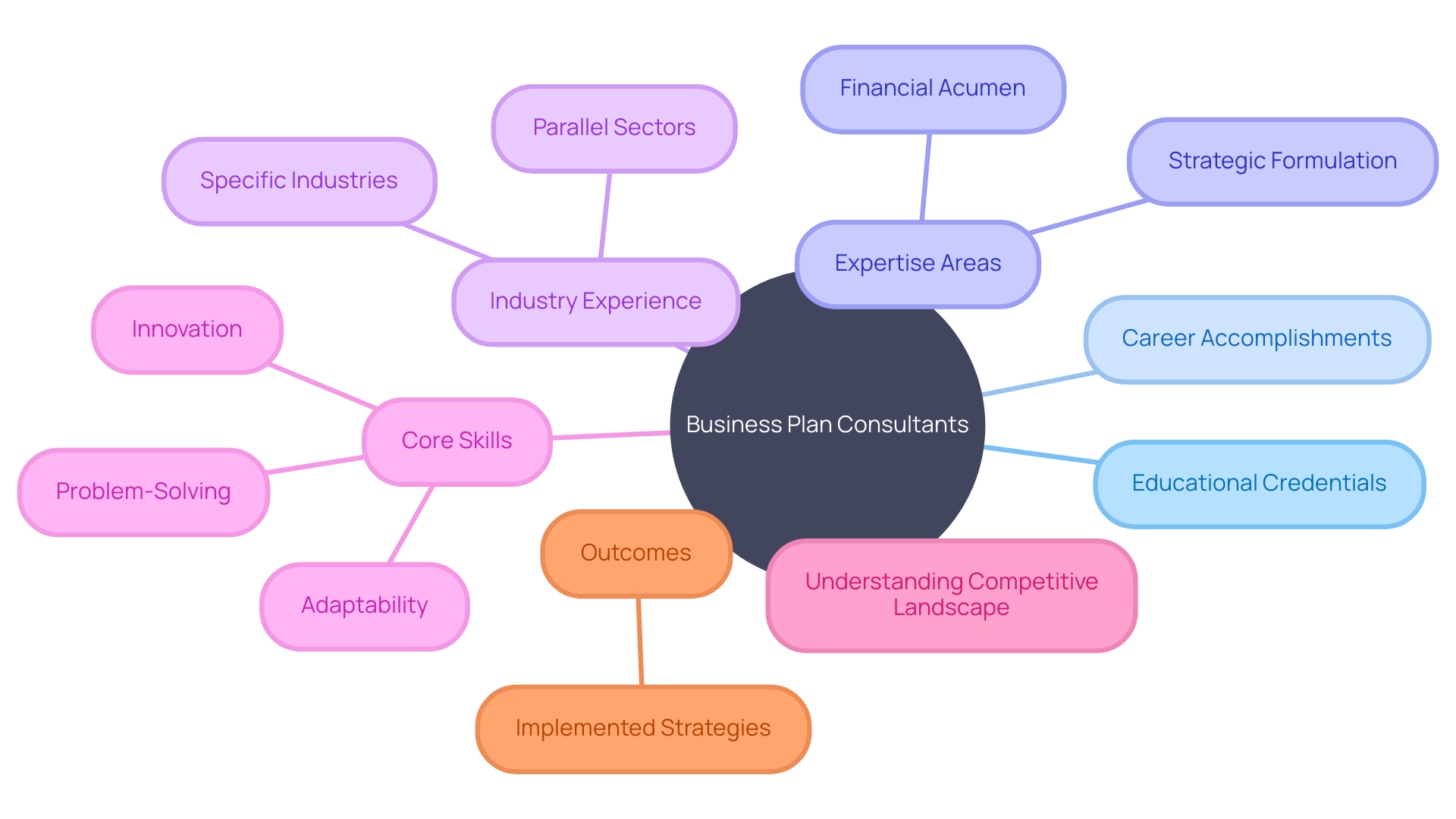
Evaluating Experience and Success Stories
When seeking consultancy for crafting a stellar business plan, it's essential to zero in on professionals with a verifiable history of catalyzing organizational achievements. A proficient consultant should be capable of delineating a company's vision, mission, and actionable steps, as is the essence of a business plan.
Delving into their past engagements, one should scrutinize the differential dynamics they implemented between strategic plans for general firms against those tailored for nonprofit entities. Inquisitiveness about the consultant's previous deliverables is paramount.
Querying what challenges were conquered and opportunities leveraged in their previous work will not only showcase their strategic finesse but also their adaptability in evolving market conditions. Moreover, experts warn against the naive declaration of non-existent competition, as it reflects a failure in research and can fatally undermine a venture's potential in the eyes of investors.
Tangible investment, both fiscal and temporal, from company founders elevates a plan's credibility, indicating a vested interest in the company's success. Understanding the importance of testing business hypotheses is vital – it's an educational journey that requires crafting informed theories drawn from initial customer responses and market analysis. Embracing this experimental ethos and applying it to various growth paths – such as optimizing sales or enhancing customer experience – is essential for a business plan to resonate with reality and forecast success effectively. Therefore, pinpointing a consultant who doesn't just promise theoretical models but demonstrates a pragmatic approach to market responsiveness, consumer demand discovery, and innovative problem-solving will be pivotal in shaping a business plan that is both aspirational and grounded.
Assessing Compatibility and Communication Style
Selecting the right business consultant hinges on their capacity to grasp your enterprise's unique challenges and ambitions. Hunt for a professional who eschews jargon and communicates in straightforward, comprehensible language. They should break down intricate concepts into bite-sized, digestible pieces, structuring their guidance with clear headers and bullet points for ease of comprehension.
Just as Virtusa Corporation emphasizes a tangible, 'Engineering First' execution strategy, your consultant should similarly concentrate on implementable solutions, without overwhelming you with unnecessary verbosity. Ensure your business plan consultant not merely listens but also internalizes your vision and objectives. Their adeptness in melding with your corporate environment and cooperating smoothly with your team is indispensable.
Proficient business consultants are distinguished by their blend of academic knowledge and concrete, industry-specific expertise, culminating in actionable insights that steer your enterprise toward its defined targets. Bearing in mind their depth of experience, as reflected in career history and professional feats, is vital for making an informed decision. According to comprehensive data, the consultants you partner with must manifest an unyielding commitment to addressing your business necessities, fundamentally simulating the vested interest entrepreneurs have in their own ventures.
Considering Cost and ROI Expectations
Investing in a business plan consultant is not merely an expense but a strategic move that can enhance your company's trajectory. More than just a budget allocation, it is the collaboration with a consultant that translates your vision into a structured strategy, crystallizing your organization’s goals and necessary steps for achievement.
It's crucial that the consultant's expertise aligns with the intricacy of delineating the difference between a standard business plan and the nuanced strategic planning required for your specific enterprise, including non-profits which have their unique set of requirements. Their insight enables you to raise pertinent questions that anticipate future challenges and weave them into the plan.
A comprehensive business plan is your financial roadmap—a tool that simplifies complex financial landscapes into actionable steps as suggested by financial experts. The financial planner's role, much like a trusted advisor, is to walk you to wealth by understanding, developing, and monitoring your financial path, underscoring the importance of financial literacy in making informed decisions. Your commitment to this process is an investment that can yield substantial ROI as your consultant helps position your company to attract investors, secure financing, and propel growth.
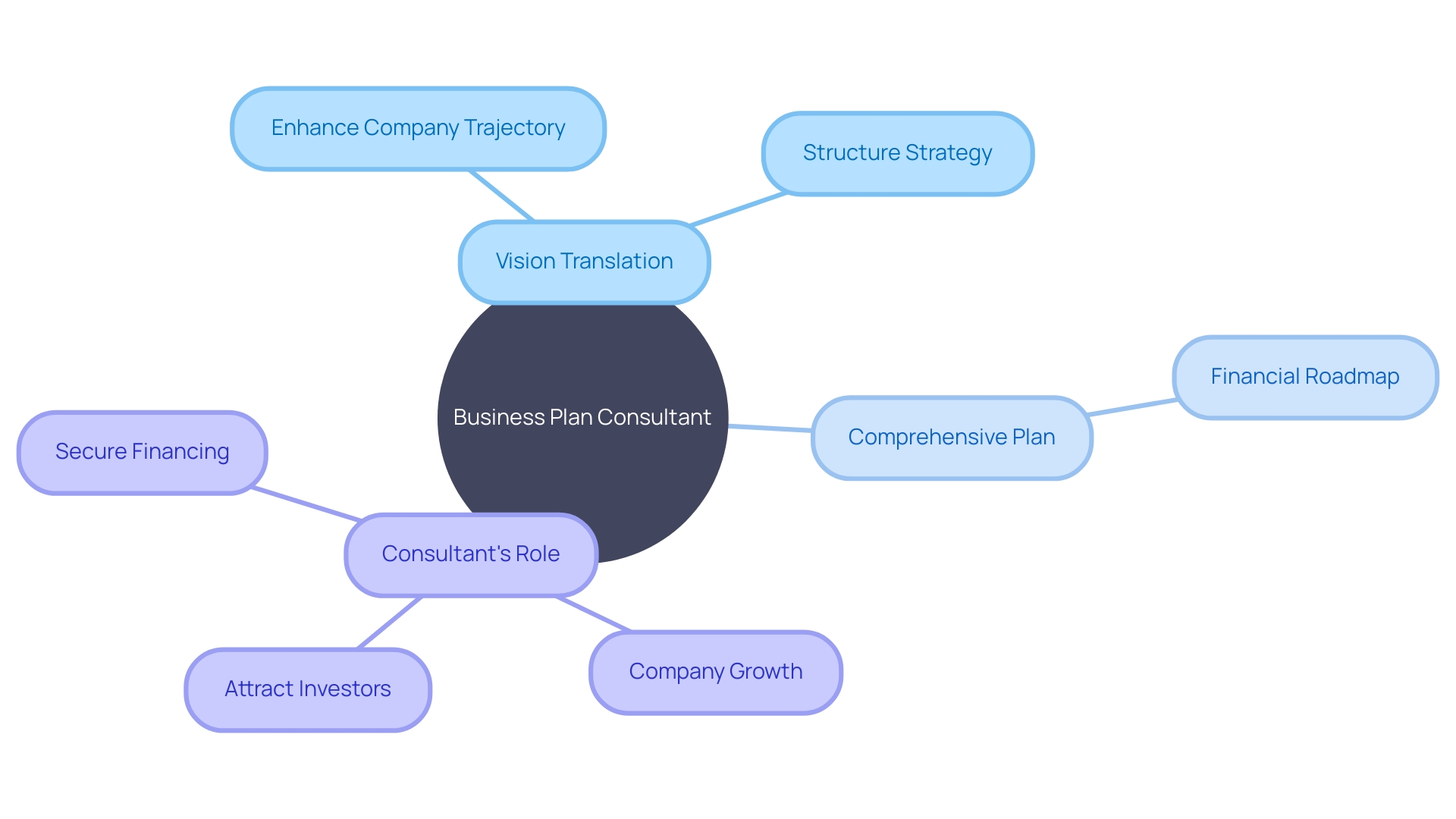
Researching and Verifying Credentials
When evaluating potential consultants for your business plan, it's crucial to conduct a thorough vetting process. Check whether the consultant has relevant certifications, analyze their membership in industry-related associations, and review any accolades they may have earned. This scrutiny not only confirms their credentials but also assures their expertise in guiding businesses to strategic success.
A small business consultant, as an example, can offer specialized advice in areas such as marketing, financial management, and strategic planning. They bring a wealth of experience and can provide objective insights to help navigate your business challenges. Their role may vary—from augmenting your existing staff with specialized skill sets to developing comprehensive sales and marketing strategies.
Remember, the lack of competition should not be mistaken for a lack of a viable market. It could indicate the need for increased market research or the opportunity for consumer education. As such, a consultant's role can be pivotal in identifying these areas and deploying effective strategies.
Given the low initial costs for setup, engaging with the right consultant can yield substantial returns for your business. Therefore, when selecting a consultant, ensure that their qualifications and experience align precisely with your business needs. This will help drive your business forward with well-informed strategies and operations that reflect your unique business goals and objectives.
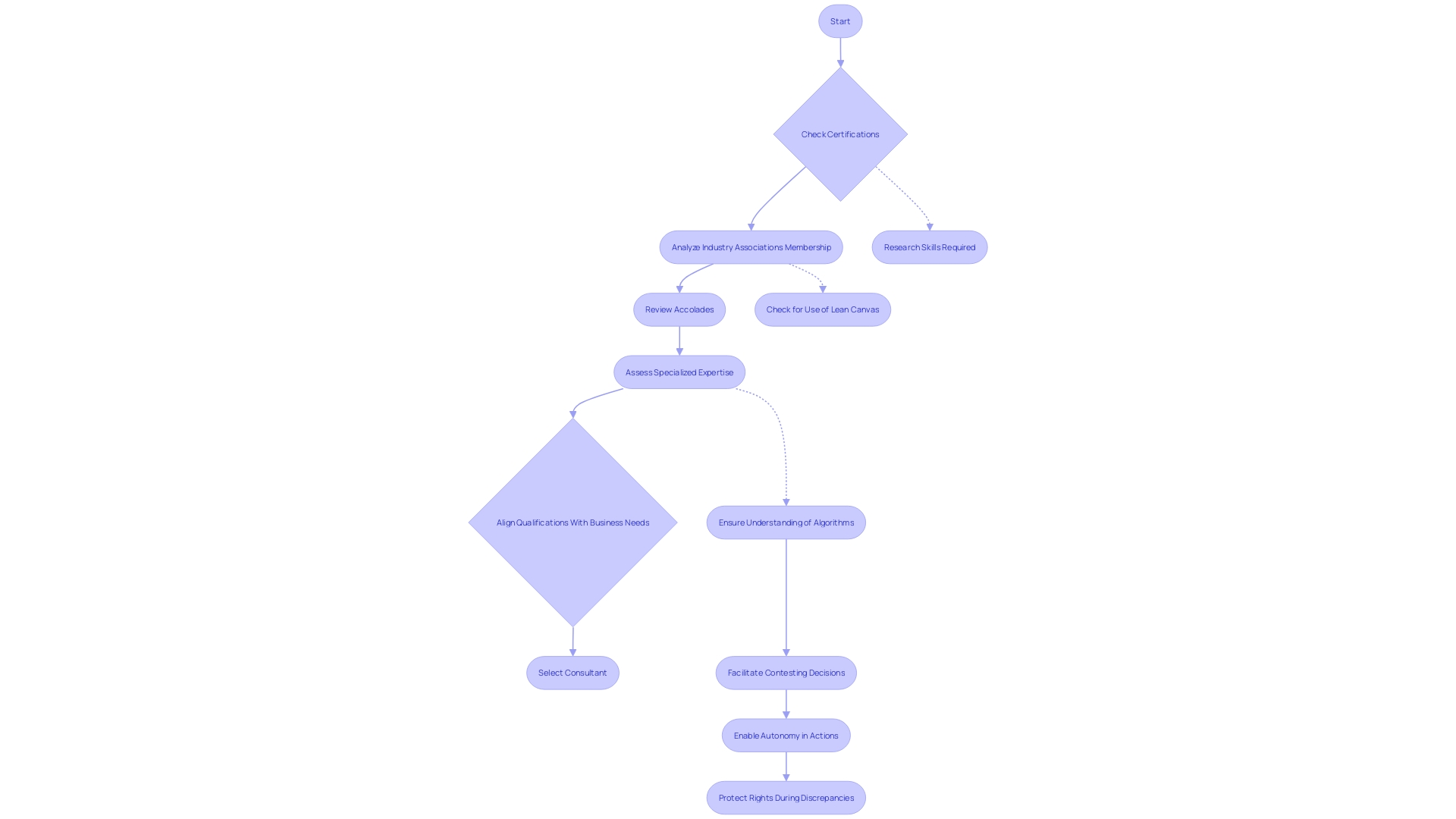
Conducting Interviews and Asking the Right Questions
Engaging a business consultant can be a pivotal decision for your company, one that requires due diligence to ensure alignment with your strategic goals. A business consultant acts both as a discerning analyst and an advisor, helping you to parse financial trends, industry research, and to develop policies and business proposals.
When interviewing potential consultants, it is paramount that you delve beyond the surface. Learning about their approach to constructing business plans is crucial as these are the blueprints that encapsulate your organization's vision and methodical steps to reach set targets.
Query their methodologies for market analysis, especially how they will distinguish your offerings — the 'better, faster, stronger' factors of your products or services — from those of your competitors. As Warren Buffett wisely suggests, placing trust in individuals with integrity is invaluable; trust that they will recommend strategies rooted in reliability and accountability. Understanding their data collection and analysis processes is also essential, as it speaks volumes about their capacity to offer bespoke advice. Remember, a business plan is more than just a document — it is a roadmap for navigating towards your successes and sidestepping potential obstacles, marking the difference between you and your competitors.
Reviewing and Comparing Proposals
To select a consultant adept at fostering your business growth, it's vital to scrutinize their submitted proposals meticulously. Each proposal should be a comprehensive pitch, illuminating how the consultant intends to address your business needs.
Look for detailed methodologies, specific milestones, clear deliverables, a realistic timeline, and a transparent pricing structure. These elements collectively offer insight into the consultant's competency and alignment with your strategic goals.
Furthermore, assess the proposals for their potential value and forecasted outcomes. Utilizing a weighted evaluation that balances cost against the anticipated benefits is more effective than price alone. The proposal should provide a thorough understanding, not only of the immediate solutions but also of strategies to capitalize on future opportunities that align with your broader objectives. Let the wisdom entailed within each proposal be a compass to guide you in making an informed and judicious selection—the blueprint of a partnership crafted to scale the pinnacle of success together.
Ensuring Adaptability and Flexibility
In today's dynamic business environment, agility is king. A strategic plan must be a living document, adaptable to the shifting landscapes and challenges that businesses face.
This need for flexibility extends as well to the stakeholders who help to shape and execute these strategies—particularly business consultants. It's not enough to have a consultant who sets a plan in motion; you need one who will journey with you, revising and recalibrating strategy as your business grows and the market evolves.
Adept consultants offer more than just expertise; they provide a synergy of adaptability and collaboration, taking an approach that echoes the iterative nature of a Lean Canvas. This method, popularized by Ash Maurya, breaks down complex ideas into digestible components, evolving with the business rather than remaining static.
The Lean Canvas method epitomizes the flexibility required in modern strategic planning, allowing for a swift pivot or adjustment when necessary. Indeed, a robust business plan is comprehensive, but it is also responsive, incorporating feedback and utilizing a continuous-improvement mindset.
As the landscape for industries such as AI evolves, where a handful of players can influence markets overwhelmingly—similar to California's utility companies managing wildfire risks—so too must the plans that guide these entities. The right consultant not only appreciates this complexity but thrives within it, offering the necessary breadth of services to ensure you're not just prepared for today, but future-proofed for tomorrow. Rooted in this philosophy, bespoke consulting services yield tangible benefits. They deliver fresh perspectives that enhance performance, provide access to cutting-edge market research, and furnish tailored coaching. The strategic acumen a consultant brings to the table is often the linchpin for small businesses seeking to refine operations and amplify their growth trajectory.
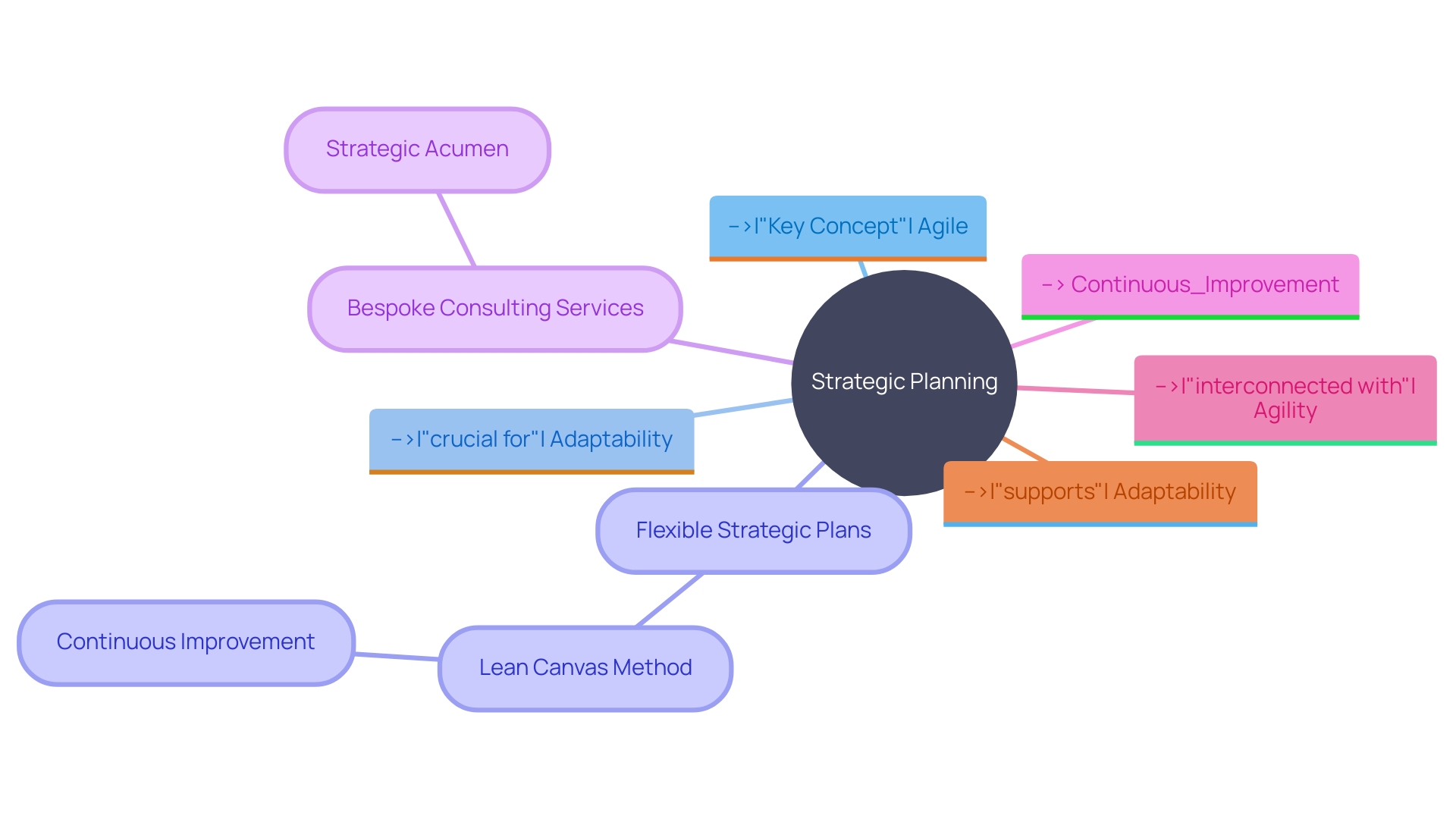
Making an Informed Decision
Selecting a fitting business plan consultant demands a strategic approach, just like the business planning process itself. A consultant not only brings expertise in critical areas such as sales strategies, marketing campaigns, IT, and financial management but also offers a roadmap to achieving your organization's objectives.
Different from a strategic plan, a business plan zeroes in on the nitty-gritty—how to operationalize your vision, define your services precisely, protect your innovations legally, and distinguish between current offerings and those under development. While a strategic plan may set the direction, a business plan serves as the action plan, detailing the necessary steps for success.
Nonprofits require a different planning approach, one that aligns with their unique missions and constraints. Therefore, pinpointing a consultant who comprehends your sector's particular challenges and opportunities is essential. Leveraging small business consulting not only connects you with specialized knowledge but also opens the door to personalized coaching and state-of-the-market research tailored to your enterprise's specific needs. Ultimately, your chosen consultant should be an asset, propelling you towards sustainable growth and a competitive edge within your industry.
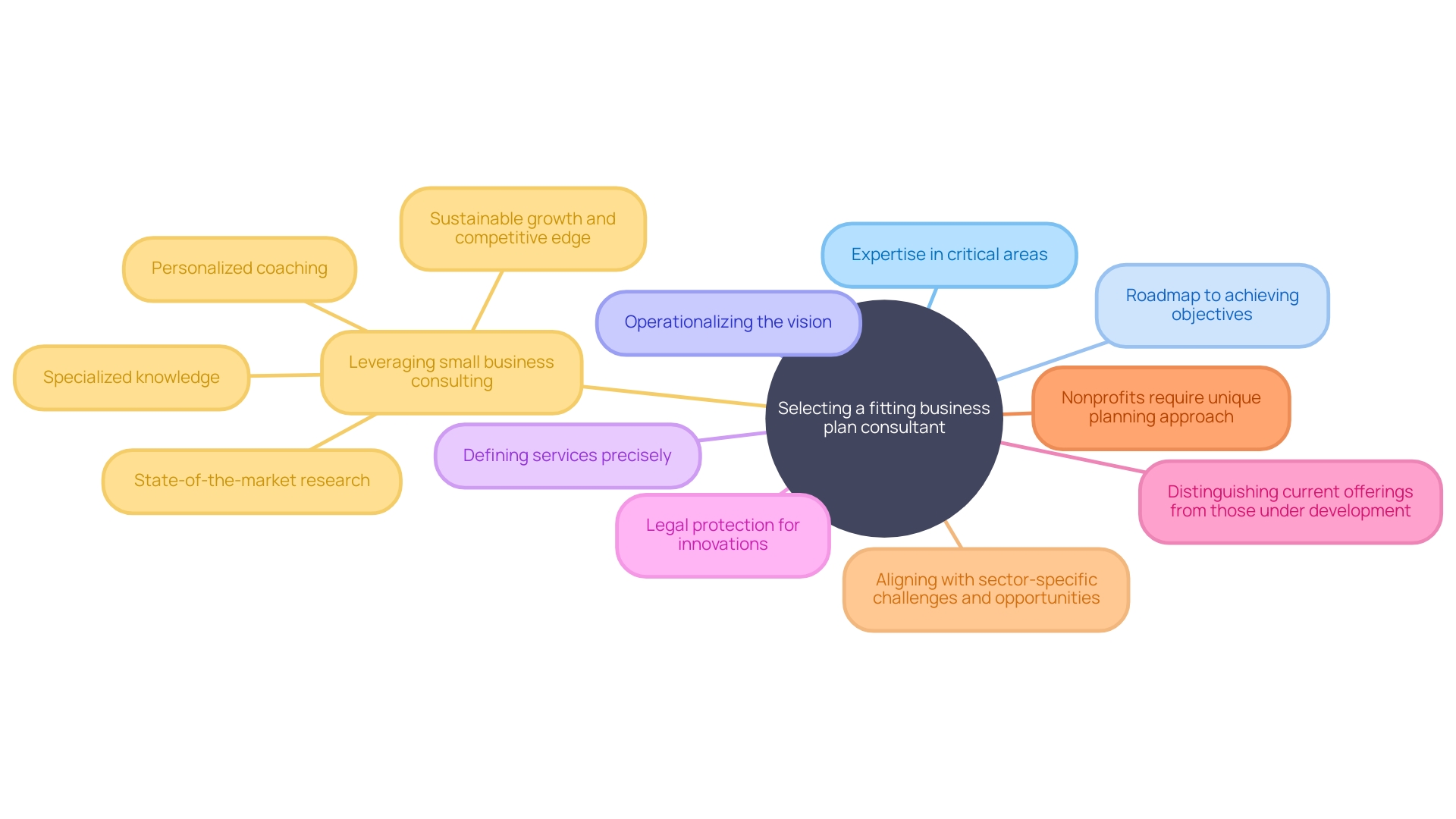
Conclusion
In conclusion, selecting the right business plan consultant is a critical step in developing a strong business strategy. The consultant should align with your organization's vision, understand your goals, and help create a solid foundation by clarifying objectives and building a financial model.
It is important to identify a consultant with the right qualifications and expertise, someone who has experience in your industry and a proven track record of success. Assessing compatibility and communication style is also essential, as the consultant should be able to understand your unique challenges and effectively collaborate with your team.
Considering cost and ROI expectations is crucial, as investing in a consultant is a strategic move that can enhance your company's trajectory. In addition, researching and verifying credentials is important to confirm the consultant's qualifications and expertise.
Conducting interviews and asking the right questions will help you determine the consultant's approach and methodologies for constructing a business plan. Reviewing and comparing proposals is crucial to ensure that the consultant's solutions align with your business needs and goals. Lastly, adaptability and flexibility are key qualities to look for in a consultant, as a strategic plan needs to be adaptable to the dynamic business environment. Making an informed decision involves considering the consultant's expertise, as well as their ability to provide tailored solutions and future-proof your business. By following these guidelines, you can select a consultant who will help propel your business towards success, providing specialized knowledge, personalized coaching, and state-of-the-market research tailored to your enterprise's specific needs.




